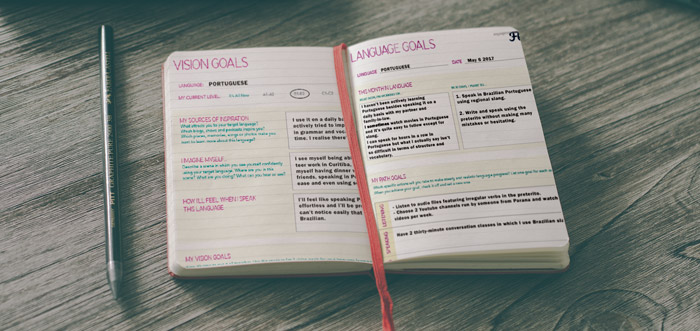It’s 9 pm, you just finished washing the dishes and you’re staring at your laptop screen.
You know what you should be doing. You had planned to review l'imparfait.
Instead, you just stare at your screen wondering where to start. Also, you're thinking what’s the point in wasting time on that? After all, you keep on forgetting how to use the imparfait because you almost never use it when you talk to your French neighbors.
Well I’m not there to discuss whether you should be learning the imparfait or not. I’d like to talk about why studying French sometimes feels so useless or boring.
If you’re trying to learn French at home and on your own, then this article is for you.
This time I chose a step-by-step approach to show you how to create a positive, driven routine when learning French. Feel free to jump right to the step that you seem to struggle with the most.
> Step 1 : How to set tangible short-term goals and gain clarity
> Step 2 : How to pick the methods and resources for French
> Step 3 : How to track your study time and feel true progress
Step 1 : How to set tangible short-term goals and gain clarity
Let me start by asking you a question.
What would you like to do that you can't do because of your current level in French?
Here are a few examples to help you get started :
Lisa fantasizes : “I'd like to ask questions and give short answers when I get invited for lunch at my in-laws, but I feel like I'm still missing some vocabulary.”Michael admits : “I'd like to do an English master in Paris but I'd need to pass an exam like the DELF B2 (equivalent to upper-intermediate level) and for now I'm still stuck at B1”
Richard decides : “I'd like to go out for drinks with my coworkers after work, but it's still hard for me to follow the full conversation of a group as French people tend to speak at the same time.”
What about you?
Try completing the following formula : "I'd like to ... but I can't yet because ..."
Now, narrow your goal down to something you realistically can achieve within 4 weeks.
How do you know what's doable and what's not?
Well it all depends on where you stand in your French journey. It also depends on how much time per week you can invest in practice and review.
Ask yourself the following questions :
- What do I already know in grammar and vocabulary that could be useful for my end goal?
- What do I want to achieve exactly by the end of the month? (write down something measurable or clear topics you want to master)
- How much time can I spend on French every week this month?
- How will you use your weekly French study time, meaning which skill will you practice and how?
Let me give you a few examples using Lisa, Michael and Richard once again :
Find out how Lisa plans to speak to her in-laws at lunch
Find out how Michael wants to learn for the DELF exam
Find out how Richard will prepare for coworker meetups
If you’re still having doubts on your French goals, then why not share them in the comments below so I can give them a look?

Step 2 : How to pick the right methods and resources for French
Once you know what you’ll be working towards, you need to decide how you’ll study French at home. Preferably you’ll use resources and methods that will keep you away from boredom, frustration and ultimately waste your time.
Start with finding out which methods and tools work best for you in terms of level, needs and preferences.
I’ll keep using examples to explain what I mean. As you may have noticed I like to be specific!
Level : depending on if you have an intermediate or advanced level in French I would suggest a different method to practice your listening skills.
As an intermediate learner you'll want to work with short pieces of audio supported by visual, like a Youtube video. You'll want a script or French subtitles and your goal will be to catch the gist of the story.
On the other hand, an advanced learner will focus on audio only and avoid subtitles. He'll want to make notes of new expressions and subtle details like a regional accent or the use of irony.
Needs : depending on the skill you want to practice and improve, you'll need to have some time alone to absorb and review or you'll need the help of someone else to make sure you're going in the right direction.
Typically, active skills like speaking, listening and writing will be the kind where you need a partner and passive skills like reading or vocabulary and grammar review will be solitary tasks.
Preferences : you may have heard of learning styles before. In short, some people learn better by viewing new content, others by hearing it.
There are a few other categories which you can consult here. Unlike what we imagine, there are ways of learning vocabulary using only audio resources. Likewise, it’s possible to understand and retain some grammar structures using context and real-life situations instead of a textbook (not all rules, though). Take this test and find out which methods help you the most.
So concretely, which tools would I recommend using to learn French on your own at home (and preferably for free)?
- For your vocabulary : Memrise, Quizlet ;
- For your writing skills : Lang-8, italki Notebook ;
- For your listening skills : Lyrics Training, Forvo,
Rhinospike ;
- For your speaking skills : italki Langage Partners, Conversation exchange, Tandem.
If you feel like you could use some help with picking the right tools, I made a free course that helps you find the most relevant resources based on your goals.
Moving on to the last and most tricky step. I say it’s the most difficult part because I tend to get stuck right there. Want to know why? Read on!
Step 3 : How to track your study moments and feel true progress
Usually I have no difficulty visualizing what I want to learn and finding out the best way to learn it after doing some research or using processes I created previously for my own students.
But then comes the time to stop planning and actually get down to work, and I typically get frustrated about it because I usually never manage to follow the schedule I had created for myself! Things pop up in life and you have to let go, right?
That’s why I want to recommend a different method to approach your learning routine.
Stop trying to control exactly when you’re going to learn. Instead, decide on the spot when you feel like it’s a good time to review or practice French.
Knowing your goals and your preferred resources will help you get into that learning space at the speed of light, but you don’t need to decide weeks in advance exactly when you’ll do X or Z.
What you need to do is to throw away your idealized schedule and stop trying to guilt yourself into studying French. That doesn't work for anyone.
Remember how I started this post by saying I wanted to show you a way to learn in a positive, driven way?
Well I meant it, and Kerstin from Fluent Language helped me immensely in finding a better way to review and practice foreign languages on my own at home.
What she proposes is to track your progress by logging every single effort you’ve made at learning French, even if it’s just 5 minutes a day (though longer study sessions are encouraged). A little bit like using a bullet journal actually.

A view of my own worksheets when I studied Portuguese
She created a Language Habit Toolkit that doesn’t use any schedule. Instead, she made a series of 5 reusable worksheets and an ebook that focuses on visualizing your goals then making them concrete enough to implement them easily.
You get to write down each small success you had with French and each month you wrap up by looking at what you've managed to learn (or not).
It was tough to evaluate myself using her method, yet so useful. I got to see exactly which tools were worth my time and which methods didn’t help me meet my goals. I noticed which days and moments I was particularly productive or excited about working on Portuguese.
When she gave me the opportunity to test her brand new Toolkit, I was delighted as I was having a hard time with the implementation of my ambitious learning schedule. What I realized was that I could give up on that and still make true progress.
In conclusion, if you want to learn French at home at your own pace, you will need to make a few decisions :
1. Set goals for yourself that you'll be able to achieve within a short amount of time so you don't get discouraged or lose sight of your progress.
2. Pick French material that fit with what you want to practice and that you won't mind using on a weekly basis.
3. Avoid scheduling everything in advance and instead try to track your actual study moments with Kerstin's toolkit or something like a bullet journal for a real look at your progress.
PS : If you buy the Language Habit Toolkit through one of the links above I will get a commission because I'm an affiliate for Kerstin's language learning kits.
I only recommend products of quality that I truly believe will help you and that I consider reasonable in price.



I love the idea of not scheduling. When I took French in school scheduling worked, because I had to get the homework done & prepare for exams, but studying on my own, keeping to a schedule never works. I’m setting up my goals for Russian in the coming month today, so after reading this I think I’ll list out what I want to do, but not worry about scheduling them for specific days. Schedules & deadlines can be very helpful, but when they get missed, end up causing more frustration.
Absolutely Will! I gave up on scheduling a lot of things in daily life and instead I try to apply the 20/80 rule which is to do only the 3 tasks that I believe will have the most impact on my day and life. I’m sure this could be applied to learning a language as well. Certain things we think we need to do (like perhaps learning the imparfait?) may not be as essential as we think they are.
Bonjour! I found this blog because it’s on Kerstin’s blog tour.
This article is awesomely written. Really!
The examples using Lisa, Michael and Richard are pretty cool.
I read once about the importance of setting short-term goals but here you go beyond and give us some tips on how to set them, which is truly useful.
You proposed a sharing of French goals, I don’t have any short or medium terms set (it will definitely change after this article), just a long-term goal: Be as close as possible to a B2 level of proficiency in one year (Dec/2016 to Dec/2017). It seems pretty achievable, but short-term goals and habit tracking will make it easier.
I’ve been ‘actively learning’ through apps like Mondly and Duolingo and reading newspapers for about 20-30 min every day. France Inter and Europe 1 have taken a great part of the ‘passive learning’, they are on for at least two hours a day.
I try to book a tutor on Italki for an hour every week, but it’s not always possible.
A note on your Portuguese learning, keep on practicing. Não é uma língua fácil, mas é muito bonita 🙂
Oh you made me blush Max, I’m happy you enjoyed the examples and the details of goal-setting in general.
I’m a fan of short-term goals because it’s really hard to know how far we can get within longer periods like 6 months or even a full year. I generally have no clue how much I will have grown within that amount of time because there are so many factors that influence my capacity to improve.
Thank you for mentioning your goals, I don’t know what you current level is in French so it’s hard to judge but you seem to be consistent in your learning and that’s extremely important. As for Mondly, I’ll need to look that up because I had never heard of it. In any case, obrigada por seu comentario generoso e até mais!
Bonjour
Je voudrais être capable de bien parler et écrire le français.
Qu’est_ce que je dois faire?
Merci d’avance